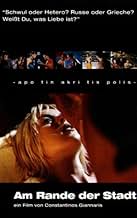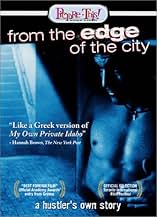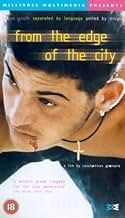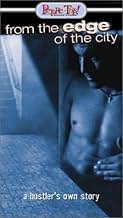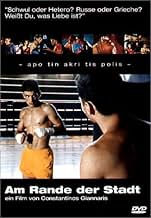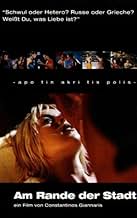AVALIAÇÃO DA IMDb
6,4/10
1,5 mil
SUA AVALIAÇÃO
Adicionar um enredo no seu idiomaA group of Pontian Greek immigrant teenage dreamers dwelling marginalised in the notorious and lustreless wild suburbia, witness the city's repulsive face and an unrelenting world defined by... Ler tudoA group of Pontian Greek immigrant teenage dreamers dwelling marginalised in the notorious and lustreless wild suburbia, witness the city's repulsive face and an unrelenting world defined by prostitution, drugs, and inevitably, loss.A group of Pontian Greek immigrant teenage dreamers dwelling marginalised in the notorious and lustreless wild suburbia, witness the city's repulsive face and an unrelenting world defined by prostitution, drugs, and inevitably, loss.
- Direção
- Roteirista
- Artistas
- Prêmios
- 2 vitórias e 4 indicações no total
Costas Kotsianidis
- Kotsian
- (as Kostas Kotsianidis)
Emilios Chilakis
- Nikos
- (as Aimilios Cheilakis)
Vasias Eleftheriadis
- Pateras (Father)
- (as Vasias Eleftheriadis, Vasia Eleftheriadis)
Eleni Philippa
- Tsatsa (Madam in Brothel)
- (as Eleni Filippa)
Avaliações em destaque
...a repeated comment from one of the interviewees in this strange little film from Greek writer/director Constantine Giannaris. Struggling somewhere between a docudrama and a ethnic drama, FROM THE EDGE OF THE CITY is written and filmed with gritty realism techniques that in the end adds some charm to an otherwise meandering movie.
During the Soviet Union era Greek Khazahkstani expatriates fled to Athens, Greece where they attempt to fit in to the Greek culture and society. But as with most immigrant groups there are challenges to face in trying to find their niche on the outskirts of a major city. The little town where they live is called Menidi and while the adults have learned Greek and found jobs, a group of teenagers who speak a mixture of Russian and Greek want the good things of life found in Athens yet waste away their own lives on roller-blading, petty crimes, cruising, drugs, male prostitution, and sexual and criminal exploitation by the wealthy Greeks: they want the good life without working for it.
The focal person of the film is Sasha (Stathis Papadopoulos) - the one who refers to himself as Rosa Ponds in interview. As with the rest of the cast he is a beautiful young man with many conflicts who seems to be seeking his identity. He and his friends move from drugs to petty crime to criminal involvement with prostitution (of both gay and straight forms). There are many subplots that could use more definition as the film tends to meander about the streets without direction. The boys become involved as both victims and perpetrators of abusive behavior, yet there is something in the nature of Sasha that makes us hope his life will even out.
Giannaris worked with street kids with no prior acting experience, a fact the gives a true sense of verismo to the film. Both the men and women involved are eye candy and while this film is being marketed as a gay movie, there is very little content to rank it as such - as though the Greek homophobia would not condone a popular movie to dwell on that subject.Nice eye candy for everyone, but not a lot of substance. Keep your expectations low and the movie will satisfy as a study of the problems of immigrants on the periphery of big cities around the world. Grady Harp
During the Soviet Union era Greek Khazahkstani expatriates fled to Athens, Greece where they attempt to fit in to the Greek culture and society. But as with most immigrant groups there are challenges to face in trying to find their niche on the outskirts of a major city. The little town where they live is called Menidi and while the adults have learned Greek and found jobs, a group of teenagers who speak a mixture of Russian and Greek want the good things of life found in Athens yet waste away their own lives on roller-blading, petty crimes, cruising, drugs, male prostitution, and sexual and criminal exploitation by the wealthy Greeks: they want the good life without working for it.
The focal person of the film is Sasha (Stathis Papadopoulos) - the one who refers to himself as Rosa Ponds in interview. As with the rest of the cast he is a beautiful young man with many conflicts who seems to be seeking his identity. He and his friends move from drugs to petty crime to criminal involvement with prostitution (of both gay and straight forms). There are many subplots that could use more definition as the film tends to meander about the streets without direction. The boys become involved as both victims and perpetrators of abusive behavior, yet there is something in the nature of Sasha that makes us hope his life will even out.
Giannaris worked with street kids with no prior acting experience, a fact the gives a true sense of verismo to the film. Both the men and women involved are eye candy and while this film is being marketed as a gay movie, there is very little content to rank it as such - as though the Greek homophobia would not condone a popular movie to dwell on that subject.Nice eye candy for everyone, but not a lot of substance. Keep your expectations low and the movie will satisfy as a study of the problems of immigrants on the periphery of big cities around the world. Grady Harp
6B24
Part Greek, part American pop culture, part Russian, part Basketball Diaries, part Fassbinder, part pity the poor prostitute.
If it were not so incoherent (or is it deliberately so?) there is much to be admired here. This is a classy film in many ways, not the least of which is how it zeroes in on urban teen disorientation in the midst of contemporary Western affluence, combining a sharp contrast between rustic origins of an immigrant underclass and trendy cosmopolitan lifestyles. And the main characters are as compelling as those of a big budget film, in no way suggesting their non-professional origins. There is likewise an unrelenting effort to reflect the way these kids actually talk to each other and think.
But it bites off way too much in trying to include something for everyone in its audience. A little coke snorting here, a little skin there, some inchoate gayness along the way, some obvious symbolism, even a taking-a-girl-home-to-meet-the-folks number (that backfires predictably). The overall effect is close to that of a television documentary rather than a dramatic story line. Something may be lost by relying on English subtitles, but for anyone unfamiliar with Russian or Greek there is no option.
Worth a look.
If it were not so incoherent (or is it deliberately so?) there is much to be admired here. This is a classy film in many ways, not the least of which is how it zeroes in on urban teen disorientation in the midst of contemporary Western affluence, combining a sharp contrast between rustic origins of an immigrant underclass and trendy cosmopolitan lifestyles. And the main characters are as compelling as those of a big budget film, in no way suggesting their non-professional origins. There is likewise an unrelenting effort to reflect the way these kids actually talk to each other and think.
But it bites off way too much in trying to include something for everyone in its audience. A little coke snorting here, a little skin there, some inchoate gayness along the way, some obvious symbolism, even a taking-a-girl-home-to-meet-the-folks number (that backfires predictably). The overall effect is close to that of a television documentary rather than a dramatic story line. Something may be lost by relying on English subtitles, but for anyone unfamiliar with Russian or Greek there is no option.
Worth a look.
FROM THE EDGE OF THE CITY, Greece's official submission for the best Foreign Film Oscar, is a multi-layered film that can likewise appeal to many spheres of society. In (homophobic?) Greece, it has been viewed as a serious study of urban angst, involving immigrant Russian Greeks avoiding any mention of the film's overkill gay content. Nevertheless, it has been a box-office success, though mainstream Greece dares not mention one of the reasons for the success is the (paid) love that likewise dares not mention its name. In contrast, the film's international exposure up to now, prior to the Oscar nominations, has been almost exclusively at International Gay Film Festivals: San Francisco and, particularly Verzaubert, which tours Germany's largest cities, including Berlin where I saw it. The American-accented openly gay director of the film (one of the few Greek professionals who has dared come out of the closet) made a point of explaining this to the all-male sold-out crowd in Berlin in late November. He made the movie as a labor of love; out of his fixation on the leading character, which, like the rest of the cast, are not professional actors, just real Russian-Greek immigrant youth. These guys' desperate quest to get ahead in the European Union's consumer-driven society leads them to crime, including male prostitution, though they themselves exploit female prostitutes. Add to those conflicts, the homoerotic overtones of these teenage guys' physical contacts, realization and open discussion of their lives as homosexual prostitutes, and the film exceeds any definition of a gay film. This is very clear. That notwithstanding, many will continue to be in denial of this, and look at the film as social commentary, as an immigration tragedy, as a generational-conflict movie. Indeed, this movie can be many things to many people.
Self-consciously hip Wasted-Youth genre piece, the usual downward spiral of sex, petty crime, and drugs, done much better, and less pretentiously, by innumerable American Black ghetto films, here set in and around Athens among a group of transplanted Pontic Kazakhstani teens. The lads hustle their bodies, flirt with but never openly embrace homosexuality, to pay for drugs, living from one score and wad of cash to the next. Of course, the film exacts retribution so that a bad end awaits all, either in the form of arrest, severe injury, or death.
The film succumbs to the pointlessness of its subject matter; there's nothing particularly profound, compelling, or even remotely sympathetic about its cast of bored, directionless, and none-too-bright loafers who do nothing but selfishly chase after money and pleasure, unscrupulously screwing each other over to fulfill the pettiest of desires. There are no big dreams, no big hearts, nothing much gained or lost.
The film tries to make up for lack of content with self-conscious flourishes of style, relying heavy-handedly on a trendy soundtrack of techno-house and dilute hip-hop, fast-forwarding the frame rate, fooling around with aperture settings, conducting mock interviews with the main protagonist for a pseudodocumentary effect, and even at one point resorting to a totally gratuitous quote from Goddard's Contempt.
It seems Europeans are now fashioning their version of a very old American genre, the lower-class-self-destruct-coming-of-age story. Except for the empty stylistic intrusions, there is hardly any difference between this movie and Erick Zonka's Le Petit Voleur (The Little Thief, '99). By an odd coincidence--talk about unoriginality--the wayward boys of both find their first criminal employment by baby-sitting a whore, both even going so far as to disastrously double-cross their pimp bosses.
Not that the Americans aren't busy recycling this same old trash: try Requiem for a Dream.
It seems a huge rift has opened up in film between mainstream morality, on the one hand, and underworld noirish voyeurism, on the other. One can either go see a squeaky-clean, soft-core, Cellophane-wrapped, light-hearted goodie like Charlie's Angels, or a dark, damaged, doomed (increasingly imported) perversion like this. Talk about specialized, fractionalized markets.
The film succumbs to the pointlessness of its subject matter; there's nothing particularly profound, compelling, or even remotely sympathetic about its cast of bored, directionless, and none-too-bright loafers who do nothing but selfishly chase after money and pleasure, unscrupulously screwing each other over to fulfill the pettiest of desires. There are no big dreams, no big hearts, nothing much gained or lost.
The film tries to make up for lack of content with self-conscious flourishes of style, relying heavy-handedly on a trendy soundtrack of techno-house and dilute hip-hop, fast-forwarding the frame rate, fooling around with aperture settings, conducting mock interviews with the main protagonist for a pseudodocumentary effect, and even at one point resorting to a totally gratuitous quote from Goddard's Contempt.
It seems Europeans are now fashioning their version of a very old American genre, the lower-class-self-destruct-coming-of-age story. Except for the empty stylistic intrusions, there is hardly any difference between this movie and Erick Zonka's Le Petit Voleur (The Little Thief, '99). By an odd coincidence--talk about unoriginality--the wayward boys of both find their first criminal employment by baby-sitting a whore, both even going so far as to disastrously double-cross their pimp bosses.
Not that the Americans aren't busy recycling this same old trash: try Requiem for a Dream.
It seems a huge rift has opened up in film between mainstream morality, on the one hand, and underworld noirish voyeurism, on the other. One can either go see a squeaky-clean, soft-core, Cellophane-wrapped, light-hearted goodie like Charlie's Angels, or a dark, damaged, doomed (increasingly imported) perversion like this. Talk about specialized, fractionalized markets.
If you see one contemporary Greek film, make it this one. Giannaris shows great promise as a director - raw, yet sensitive, and original. The film looks at the lives of young immigrants boys from the former Soviet Union caught between the work-hard ethic of their parents and the seductiveness of the modern, consumer-driven world. These kids live on the edge and Giannaris's film has an appropriately edgy feeling. Young, these boys feel invincible even though they live on society's margins where the trappings of a designer lifestyle seem to have more value than a human life. 'From the Edge of the City' delves deep into the seamier underbelly of modern society but with a special sensitivity that does its filmmaker and its subjects credit.
Você sabia?
- CuriosidadesMost of the actors were non-professionals who were discovered on the streets of Athens by director Constantine Giannaris. His lead, Stathis Papadopoulos, was actually working as a rent boy.
- ConexõesFeatured in Schau mir in die Augen, Kleiner (2007)
- Trilhas sonorasDon't Stop the Reggae Music
Written by C.A. Boswell, I. Phillips, P. Gayle, F. Thompson, C. Hall
Performed by Spida (From the Refugee Camp) Peal the Tarantula Crew
Principais escolhas
Faça login para avaliar e ver a lista de recomendações personalizadas
- How long is From the Edge of the City?Fornecido pela Alexa
Detalhes
Contribua para esta página
Sugerir uma alteração ou adicionar conteúdo ausente

Principal brecha
By what name was Apo tin akri tis polis (1998) officially released in Canada in English?
Responda


